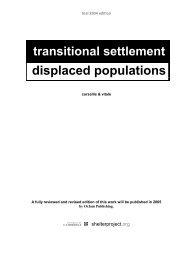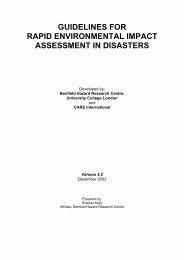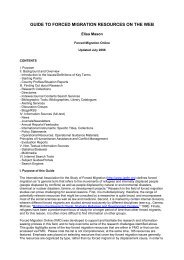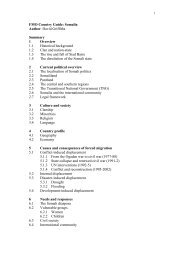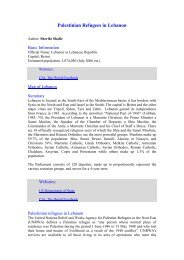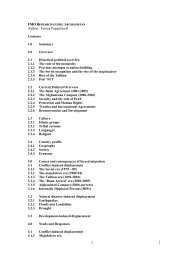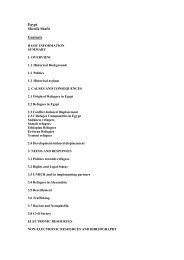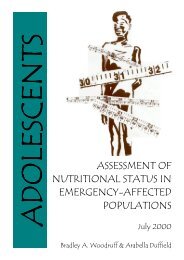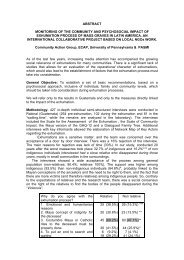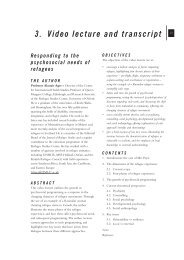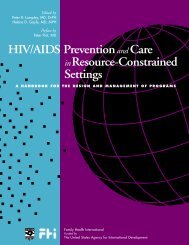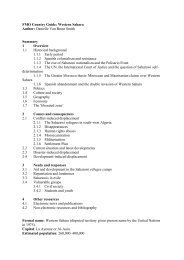FMO Country Guide: Ethiopia - Forced Migration Online
FMO Country Guide: Ethiopia - Forced Migration Online
FMO Country Guide: Ethiopia - Forced Migration Online
Create successful ePaper yourself
Turn your PDF publications into a flip-book with our unique Google optimized e-Paper software.
million to 4 million years old. It is the place where ‘Lucy’, the hominid skeleton dating<br />
back 3.18 million years, was found. In June 2003, archeologists found Homo Sapiens<br />
skulls in the Herto village of the Afar Region that is estimated to be between 154,000 to<br />
160,000 years old. The remains have been named ‘Edaltu’, meaning ‘grandfather’ in the<br />
Afar language.<br />
1.3 Politics<br />
The Federal Democratic Republic of <strong>Ethiopia</strong> (FDRE), which came into existence in May<br />
1991, has a parliamentarian form of government and comprises nine regional states (Afar,<br />
Amhara, Benishangul-Gumuz, Gambella, Harar, Oromiya, Somali, Tigray, and SNNP)<br />
and two administrative cities (Addis Ababa and Dire Dawa). The federal government<br />
resides in the capital city of Addis Ababa, administratively known as Region 14. Addis<br />
Ababa is also the economic center of the country and hosts a number of headquarters of<br />
international organizations (see Major organizations in <strong>Ethiopia</strong>).<br />
The federal and regional government has legislative, executive, and judicial powers. The<br />
House of People's Representatives is the highest authority of the federal government and<br />
is answerable to the people nationally. The State Council is the highest organ of state<br />
authority and is responsible to the people of in that particular state. There are two houses<br />
in the government - the House of People's Representatives and House of the Federation.<br />
Members of the House of People's Representatives are elected by the people for a term of<br />
five years. The political party or coalition of political parties that have the greatest<br />
number of seats in the House of People's Representatives form and lead the Executive.<br />
The House of the Federation is composed of representatives of nations, nationalities, and<br />
peoples. Members of the House of the Federation are elected by the State Council. The<br />
State Council either elects representatives to the House of the Federation, or holds<br />
elections to have them elected directly by the people.<br />
The president of the FDRE is the head of state, and is nominated by the House of<br />
People’s Representatives. Election is, however, decided jointly by the House of People's<br />
Representatives and the House of the Federation. The term of office of the president is six<br />
years; no person can be elected president for more than two terms. The current president<br />
is Ato Girma Wolde Giorgis. The highest executive powers of the federal government are<br />
vested in the Prime Minister and in the Council of Ministers. The Prime Minister is the<br />
chief executive, the chairman of the Council of Ministers, and the commander-in-chief of<br />
the national armed forces. The current Prime Minister is Ato Meles Zenawi.<br />
1.4 Economy<br />
According to the Second Annual Report on the <strong>Ethiopia</strong>n Economy (2000/2001), it is<br />
estimated that close to 30 million <strong>Ethiopia</strong>ns live in absolute poverty, failing to satisfy<br />
their basic needs on a day-to-day basis. <strong>Ethiopia</strong>’s Gross Domestic Product (GDP) per<br />
capita is US$100, with an average GDP growth per capita of 2.8 per cent. Looking at<br />
sectoral contributions to the overall GDP, 52 per cent is derived from the agricultural<br />
sector, 11.1 per cent from the industrial sector, 7 per cent from the manufacturing sector,<br />
and 36.5 per cent from the service sector.<br />
5



